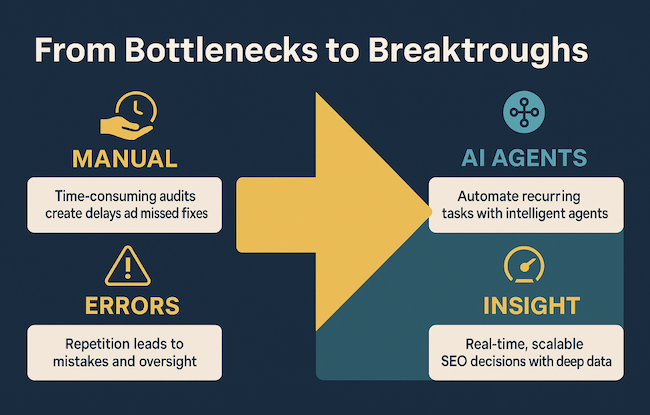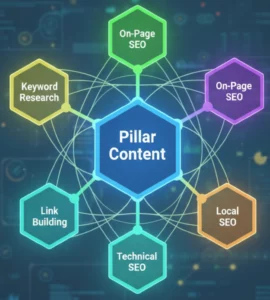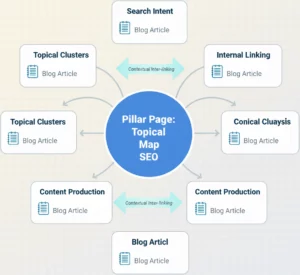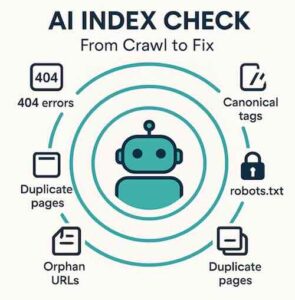
Integrating ai workflow automation into your SEO operations is rapidly becoming a game-changer for digital marketers and businesses seeking measurable performance improvements. As the pressure to scale organic growth increases, leveraging an AI SEO audit tool streamlines complex tasks, surfaces actionable insights, and keeps your SEO strategy on auto-pilot freeing up valuable time for high-impact projects.
- Accelerate SEO audits and identify critical opportunities in minutes
- Enhance content optimization and keyword analysis with AI-driven insights
- Reduce manual work and ensure ongoing compliance with search engine standards
- Boost your team’s efficiency while maintaining strategic oversight
In this guide, discover how to prepare, integrate, and maximize the benefits of AI workflow automation using a next-generation SEO audit tool like Hack The SEO empowering teams of all sizes to outperform competitors and unlock sustainable growth.
Table of Contents
ToggleContext and importance of AI workflow automation in SEO
The new standard for SEO: Why AI workflow automation matters

In today’s digital landscape, the volume and complexity of SEO audits have surged. Marketers and SEO specialists must regularly analyze technical issues, optimize content, and monitor keyword rankings all while the search engine algorithms evolve. Manual approaches often lead to bottlenecks, delayed improvements, and missed opportunities. This is where AI workflow automation steps in, transforming how businesses approach SEO by automating repetitive tasks, surfacing deep insights, and driving faster, data-driven decisions.
AI workflow automation, especially through an advanced tool like Hack The SEO, enables teams to move beyond traditional, manual audits. By leveraging AI agents, businesses can identify and address technical issues, analyze competitor strategies, and provide actionable recommendations at scale. The result is a proactive SEO strategy that adapts in real-time, ensuring continuous improvement and superior performance for your website.
AI workflow automation reduces manual research time from days to minutes, empowering teams to focus on high-value tasks and unlock new growth opportunities.
Embracing AI-powered automation is no longer optional for organizations aiming to stay competitive it’s a necessity for efficient, scalable, and resilient SEO strategies.
In summary, adopting AI workflow automation is an important step toward future-proofing your SEO operations and maintaining a sustainable edge in search engine visibility.
Key benefits of integrating an AI SEO audit tool into your process
Unlocking the advantages of AI-powered SEO audits
Integrating an AI SEO audit tool into your workflow offers a wide range of benefits that go far beyond time savings. The core advantage lies in the tool’s ability to continuously monitor and analyze your website’s performance, providing real-time recommendations and instant fixes. AI-driven audits ensure that your site remains compliant with the latest search engine updates, helping you stay ahead of competitors.
The automation of technical SEO checks, content analysis, and keyword optimization means that your SEO strategies can evolve on auto-pilot, allowing your team to focus on creativity and strategic planning. Additionally, AI tools like Hack The SEO can identify backlink opportunities and analyze competitor performance functions that would otherwise require extensive manual research.
- Faster identification and resolution of technical SEO issues
- Continuous content and keyword performance analysis
- Real-time competitor and backlink profile monitoring
- Reduced reliance on manual audits and increased workflow efficiency
Ultimately, the integration of AI SEO audit tools leads to significant improvement in website performance, engagement, and organic traffic growth.
AI-powered audits deliver measurable benefits, enabling teams to identify, analyze, and act on SEO opportunities more efficiently than ever before.
Understanding AI SEO audit tools
What is an AI SEO audit tool?
Before diving into integration, it’s essential to understand what sets an AI SEO audit tool apart. At its core, an AI SEO audit tool leverages machine learning, natural language processing (NLP), and automation to scan, analyze, and optimize your website for search engine performance. Unlike basic tools, these platforms interpret complex data, uncover hidden technical issues, and provide recommendations that align with current search engine algorithms.

For example, Hack The SEO’s platform crawls live Google SERPs, builds topical maps, and generates content recommendations that are both data-driven and tailored to your site’s unique structure. The end result is a streamlined, intelligent audit process that delivers actionable insights on auto-pilot helping you maintain a competitive edge.
AI SEO audit tools combine advanced data processing with real-time insights, enabling marketers to optimize their sites with unprecedented speed and accuracy.
In essence, these solutions act as a digital partner, continuously identifying new opportunities and supporting ongoing SEO improvement efforts.
Core functionalities and capabilities
AI SEO audit tools come packed with a variety of features designed to address every aspect of website optimization. Common capabilities include automated crawling, technical SEO checks, content analysis, keyword optimization, and competitor benchmarking. The true power lies in their ability to process large volumes of data rapidly, identify issues instantly, and prioritize improvements based on potential impact.
With platforms like Hack The SEO, users benefit from integrated topical mapping, real-time competitor gap analysis, backlink intelligence, and NLP-scored content recommendations. These functionalities not only accelerate the audit process but also ensure that your SEO strategies are always data-informed and aligned with the latest search engine updates.
- Automated site crawling and issue detection
- Content and keyword analysis for on-page improvement
- Competitor and backlink profile analysis
- Predictive recommendations for ongoing optimization
By providing a holistic view of your website’s health and opportunities, AI SEO audit tools empower businesses to drive continuous improvement and outperform competitors.
Differences between AI-powered and traditional SEO audits
The transition from traditional to AI-powered SEO audits marks a significant evolution in digital marketing practices. Traditional audits are typically manual, time-consuming, and prone to human error. They often rely on static checklists and require constant updates to remain relevant as search engine algorithms evolve.
In contrast, AI-powered audits utilize machine learning and predictive analytics to provide real-time, dynamic recommendations. These tools can automatically adjust to changes in search engine behavior, identify emerging trends, and surface new opportunities for improvement. Moreover, AI audits can be scheduled to run on auto-pilot, ensuring your site remains optimized without ongoing manual intervention.
Switching to AI-powered audits means moving from reactive, periodic checks to proactive, continuous optimization resulting in faster, more effective improvements.
Ultimately, the main differences lie in efficiency, accuracy, and the ability to adapt your SEO strategy in real time for sustained performance gains.
To summarize, AI-powered SEO audit tools provide a level of automation, insight, and agility that traditional approaches simply can’t match.
Preparing your SEO workflow for AI integration
Defining SEO objectives and KPIs
Before integrating an AI SEO audit tool, it’s important to clarify your SEO objectives and establish clear key performance indicators (KPIs). This process ensures that automation aligns with your broader business goals and provides a benchmark for measuring improvement.

Start by asking: What are the main outcomes you’re looking for? This could include higher search engine rankings, increased organic traffic, improved engagement, or more targeted content. Define specific KPIs such as keyword rankings, page load times, or backlink growth. By setting these targets, you provide the AI tool with the context needed to prioritize and analyze your website effectively.
Clear objectives and KPIs help AI systems deliver actionable, relevant recommendations that drive real business value.
Whether your focus is technical performance, content optimization, or competitor analysis, aligning your workflow with well-defined goals lays the foundation for successful AI integration.
Gathering data and resources for effective audits
A successful AI-powered audit depends on the quality and completeness of the data it analyzes. Gather all relevant information, including access to your website, analytics accounts, and historical SEO performance data. Integrating existing analytics tools ensures that the AI audit can provide a comprehensive, data-driven assessment.
Prepare your resources by compiling lists of target keywords, competitor URLs, and recent content changes. The more context you can provide, the better the AI tool can identify patterns, trends, and opportunities for optimization. Regularly updating your data sources ensures that your audits remain accurate and relevant as your website evolves.
- Ensure access to Google Analytics, Search Console, and CMS
- Compile recent SEO performance reports and keyword lists
- Document site structures and technical configurations
With robust data in place, AI-driven audits can uncover deeper insights and deliver more targeted recommendations.
Establishing integration requirements and team readiness
Integrating an AI SEO audit tool impacts not just technology, but also team workflows and structures. Assess your current SEO processes and identify areas that will benefit most from automation. Determine technical requirements, such as API access or CMS compatibility, and ensure your team is prepared to adopt new tools and best practices.
Encourage open communication and provide training to help team members understand the benefits of AI automation and how to leverage new features effectively. A smooth transition requires both technical preparation and cultural buy-in ensure everyone is aligned on the objectives, processes, and anticipated changes.
Team readiness is crucial for maximizing the benefits of AI workflow automation; well-prepared teams adapt faster and achieve better results.
By preparing both your technology stack and team culture, you set the stage for a seamless and impactful AI integration.
In summary, laying the groundwork with clear objectives, complete data, and team alignment is essential for effective AI-powered SEO audits.
Step-by-step integration of an AI SEO audit tool
Selecting the right AI SEO audit tool for your needs
The first step in integration is choosing an AI SEO audit tool that fits your specific requirements. Consider your business size, SEO objectives, and existing technology stack. Look for solutions that provide comprehensive technical audits, on-page analysis, competitor benchmarking, and predictive recommendations. Hack The SEO, for example, offers an all-in-one platform designed to streamline every aspect of SEO automation for businesses of any size.

Evaluate factors such as ease of use, integration options, reporting features, and the ability to customize audit parameters. Seek out tools that align with your workflow and can scale as your SEO needs grow. User reviews and case studies can provide valuable insight into a platform’s real-world performance and benefits.
Selecting a tool that matches your goals and resources is critical for successful, long-term AI workflow automation.
Choose wisely to ensure your investment delivers measurable improvement in SEO performance and workflow efficiency.
Setting up and connecting the tool to your website
Once you’ve selected an AI SEO audit tool, the next step is to set up and connect it to your website. This typically involves creating an account, verifying site ownership, and integrating with existing analytics platforms such as Google Search Console or WordPress.
Follow the onboarding instructions provided by your chosen platform, ensuring all necessary permissions and data access points are in place. Many tools offer guided setup wizards to streamline this process and reduce technical friction. Proper configuration is essential for accurate data collection and effective automation.
- Connect Google Analytics and Search Console accounts
- Verify site ownership and configure crawling settings
- Test initial audits to ensure data is flowing correctly
A smooth setup ensures your AI audit tool can deliver real-time insights and actionable recommendations from the start.
Customizing audit parameters and automation settings
To fully leverage your AI SEO audit tool, customize the audit parameters and automation settings to match your specific objectives. Tailor the frequency of audits, define target keywords and URLs, and set thresholds for alerts and recommendations. Advanced platforms like Hack The SEO allow you to schedule recurring tasks, automate content checks, and fine-tune the depth of technical analysis.
By personalizing these settings, you ensure the tool provides relevant, actionable insights that align with your strategy. Regularly review and update your automation preferences as your website evolves or as new SEO priorities emerge.
Customizing your AI audit tool ensures it remains aligned with your goals and adapts as your strategy and site requirements change.
Ongoing adjustment of settings is key to maximizing the value and efficiency of AI-driven SEO audits.
To recap, careful tool selection, seamless setup, and thoughtful customization lay the foundation for a successful integration process.
Leveraging AI for efficient SEO audits
Automated technical SEO checks and instant fixes
AI SEO audit tools excel at conducting comprehensive technical checks across your website, flagging issues like broken links, slow-loading pages, missing metadata, and duplicate content. Unlike manual audits, these platforms analyze your site structure in real-time and often provide instant, one-click fixes for common problems.
For example, Hack The SEO’s agents can crawl your entire website on auto-pilot, identify technical issues, and dispatch immediate fixes to your CMS reducing downtime and maintaining optimal search engine performance. This automation minimizes manual intervention and ensures your site remains in top technical shape at all times.
Automated technical audits keep your website compliant with evolving search engine standards and prevent minor issues from escalating into major problems.
By leveraging AI-driven checks, businesses can improve site health, user experience, and long-term SEO results with minimal effort.
On-page and content optimization using AI insights
One of the most impactful features of AI SEO audit tools is their ability to analyze and optimize on-page content. By examining factors such as keyword usage, internal linking, and topical relevance, these platforms provide actionable insights to enhance your content’s performance and engagement.
With Hack The SEO, you can generate NLP-scored articles, identify keyword gaps, and optimize headings, meta tags, and structure all tailored to your target audience. AI-driven recommendations ensure your content remains competitive, relevant, and aligned with user search intent, driving higher engagement and organic rankings.
- Optimize content for target keywords and semantic relevance
- Identify opportunities to enhance topical authority
- Monitor content performance and adjust in real time
NLP-scored articles on Hack The SEO Tool :

These AI-powered insights transform your content strategy, making it easier to maintain high-quality, search-optimized pages across your website.
AI-driven competitor and backlink analysis
Staying ahead in SEO requires ongoing analysis of your competitors and backlink profiles. AI SEO audit tools automate this process by monitoring your rivals’ keyword rankings, backlink acquisition, and content strategies. The result is a continuous flow of intelligence that informs your own SEO strategies and uncovers new opportunities for growth.
Hack The SEO’s competitor gap analysis and backlink intelligence features allow you to identify strengths and weaknesses in your market. By tracking changes in competitor performance and backlink structures, you can proactively adjust your tactics and capitalize on emerging trends.
Continuous competitor and backlink monitoring with AI ensures your SEO strategies remain agile, data-driven, and effective in a dynamic search landscape.
Integrating these capabilities into your workflow positions your business to outperform competitors and achieve sustainable organic growth.
In short, leveraging AI for technical, content, and competitor audits delivers faster, more accurate, and more impactful SEO results.
Maximizing workflow efficiency with AI automation
Streamlining recurring audit tasks and bulk page updates
AI workflow automation shines in its ability to handle repetitive tasks and large-scale updates. Scheduling regular site audits, automatically applying fixes across multiple pages, and updating meta tags in bulk are just a few ways AI can save your team hours of manual work. This not only frees up resources for more strategic initiatives but also ensures your website remains optimized at all times.

By automating recurring tasks, you can maintain consistency in SEO performance and quickly implement changes in response to new search engine guidelines or market trends. Hack The SEO’s bulk update features allow users to make widespread improvements with minimal effort, supporting ongoing site optimization.
Automated bulk updates and scheduled audits keep your SEO efforts on auto-pilot, maintaining peak performance with minimal manual input.
Streamlining these processes increases overall workflow efficiency and allows your team to focus on higher-value opportunities.
Real-time monitoring, alerts, and predictive recommendations
Modern AI SEO audit tools offer real-time monitoring and instant alerts for critical issues or emerging trends. By analyzing data streams from your website and competitors, these platforms can provide predictive recommendations to help you stay ahead of the curve.
For example, Hack The SEO’s AI agents continuously monitor site performance, keyword rankings, and competitor changes, sending timely notifications when action is needed. This predictive approach helps businesses prevent problems, capitalize on opportunities, and refine their SEO strategies before competitors do.
- Receive instant alerts for technical or performance issues
- Get predictive insights on keyword opportunities and threats
- Proactively adjust strategies based on real-time data
Real-time intelligence is essential for maintaining a proactive, competitive SEO stance in today’s fast-moving digital environment.
Balancing automated and manual interventions for best results
While AI automation delivers impressive efficiency gains, it’s important to strike the right balance between automated processes and human oversight. Certain tasks, such as creative content development or nuanced strategic decisions, still benefit from expert input and manual review.
Establish clear guidelines for when to rely on AI-driven recommendations versus manual interventions. Regularly review audit reports, validate automated changes, and use AI-generated insights to inform but not replace your strategic planning. This hybrid approach ensures that your SEO workflow remains flexible, accurate, and responsive to both data and experience.
The most successful SEO teams blend AI automation with human expertise, ensuring both efficiency and high-quality outcomes.
Maintaining this balance allows you to maximize the benefits of AI workflow automation while preserving the creativity and insight that drive long-term SEO success.
In summary, AI automation empowers teams to streamline recurring tasks, act on real-time insights, and maintain peak SEO performance with the right mix of automation and human oversight.
| Feature | AI SEO Audit Tool | Traditional SEO Audit |
|---|---|---|
| Technical Issue Detection | Automated, real-time, predictive | Manual, periodic, reactive |
| Content Optimization | NLP-driven, dynamic recommendations | Manual review, static checklists |
| Competitor Analysis | Ongoing monitoring, instant alerts | Occasional, time-intensive |
| Bulk Updates | Auto-pilot, one-click deployment | Manual, page-by-page |
| Integration with Analytics | Seamless, real-time data flow | Manual data import/export |
Best practices and long-term strategy
Ensuring data quality and regular updates to AI systems
The success of AI SEO workflow automation depends heavily on the quality and freshness of your data. Regularly update your analytics integrations, keyword lists, and competitor profiles to ensure the AI audit tool provides accurate recommendations. Schedule periodic data reviews and clean up outdated or irrelevant information from your systems.
Platforms like Hack The SEO are designed to evolve with your site and the broader digital landscape. Regular updates to both the platform and your own data sources help maintain alignment with search engine algorithms and industry best practices.
High-quality data is the foundation for reliable AI-driven audits and sustained SEO improvement.
Establishing rigorous data management protocols ensures your AI automation remains effective as your business and the search landscape change.
Continuous optimization based on AI audit reports
To maximize the benefits of AI SEO automation, develop a habit of continuous optimization. Review audit reports regularly, prioritize recommended actions, and track the results of implemented changes. AI tools excel at identifying new opportunities and emerging trends capitalize on this by maintaining an agile, iterative approach to your SEO strategy.
Set up recurring review cycles, involving key stakeholders to discuss findings and adjust strategies as needed. The combination of AI-generated insights and human judgment enables businesses to adapt quickly and maintain a competitive edge.
- Schedule monthly or quarterly audit reviews
- Document changes and measure their impact
- Adjust strategies based on evolving AI insights
Continuous optimization ensures your SEO efforts remain aligned with both your business goals and the evolving digital landscape.
Building a proactive SEO strategy with ongoing AI insights
The ultimate goal of integrating AI workflow automation is to build a proactive, forward-looking SEO strategy. Use ongoing AI insights to anticipate algorithm changes, identify emerging opportunities, and respond to shifts in user behavior. A proactive approach allows you to make strategic changes ahead of competitors and consistently drive organic growth.
Encourage your team to experiment with new tactics, test AI-generated recommendations, and learn from both successes and setbacks. Over time, this proactive mindset will help you establish authority in your niche, improve engagement, and achieve sustained performance improvement.
A proactive SEO strategy powered by AI insights positions your business for long-term success in an ever-changing search environment.
By embedding continuous learning and innovation into your workflow, you can fully realize the benefits of AI workflow automation.
To conclude, following best practices and maintaining a long-term strategy ensures your investment in AI-powered SEO delivers lasting results and competitive advantage.
How does an AI SEO audit tool improve efficiency?
An AI SEO audit tool automates time-consuming audit tasks such as technical checks, content analysis, and competitor benchmarking. This allows teams to identify and resolve issues in minutes, rather than days, and focus on higher-value SEO strategies. Automation also reduces human error and ensures ongoing compliance with search engine standards.
What are the key differences between AI and manual SEO audits?
AI-powered SEO audits are automated, continuous, and data-driven. They offer real-time insights, predictive recommendations, and instant fixes, whereas manual audits are periodic, labor-intensive, and rely on static checklists. AI audits adapt to search engine changes and provide more accurate, actionable results.
Is it possible to automate all SEO audit tasks with AI?
While AI can automate most technical and analytical SEO tasks, certain activities such as creative content development, strategic planning, and nuanced decision-making still benefit from human expertise. The best results come from a balanced approach that combines AI automation with manual oversight.
How often should you run AI-powered SEO audits?
The frequency depends on your website’s size, complexity, and industry dynamics. Many businesses benefit from weekly or even daily AI audits to maintain optimal performance and respond quickly to changes. At a minimum, monthly audits are recommended to stay competitive.
What are the risks of relying solely on AI for SEO audits?
Over-reliance on AI can lead to missed context or overlook unique business nuances. It’s important to validate AI recommendations with human review and ensure your strategy remains aligned with your brand and target audience. Combining AI with manual checks mitigates these risks and delivers the best outcomes.
Integrating an AI SEO audit tool like Hack The SEO into your workflow is a powerful step toward automating, optimizing, and scaling your SEO efforts. By aligning objectives, preparing your team, and continuously optimizing based on AI insights, you can unlock efficiency gains, drive organic traffic growth, and outperform competitors with ease.
- Define clear SEO objectives and KPIs before integration
- Choose an AI SEO audit tool that fits your needs and workflow
- Leverage automation for technical, content, and competitor analysis
- Balance AI-driven automation with expert human oversight
- Continuously optimize and update your strategy with ongoing AI insights

Eric Ibanez
Co-fondateur de Hack The SEO
Eric Ibanez a créé Hack The SEO et accompagne des stratégies SEO orientées croissance. Il est aussi co-auteur du livre SEO pour booster sa croissance, publié chez Dunod.
Suggested Articles




